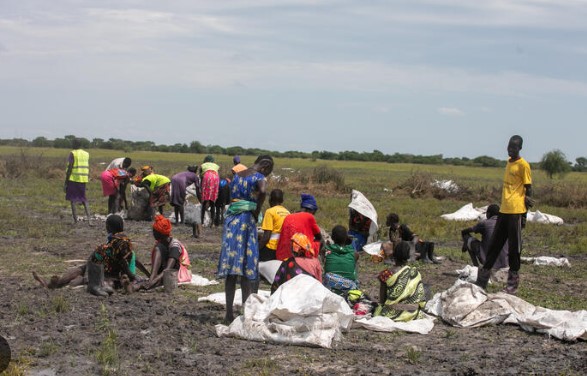By Bosco Bush
United Nations World Food Program [WFP] appeals to donors to provide early funding, frontload assistance worth $404 million for next year’s operations, following rising hunger in South Sudan.
This appeal follows the release of the WFP-FAO Hunger Hotspots report which warns that South Sudan is a country of highest concern where humanitarian action is essential to prevent starvation and death.
WFP reported empty warehousing with “no food supplies” currently in South Sudan to enable the organization to fight hunger issues in 2025, warning that, a lack of early preparations would lead to high operational costs in delivering urgent humanitarian assistance to the communities in dire need.
“WFP currently has no food supplies in South Sudan to preposition for next year’s humanitarian response and needs US$404 million to frontload assistance,” said Shaun Hughes, WFP’s Acting Country Director for South Sudan.
Cautioning that failure to do so will leave WFP reliant on expensive airdrops later in the year to reach isolated communities that are facing the most severe levels of hunger and depend on humanitarian food assistance.
Hughes disclosed that “it can take months to turn pledged donor funds into food in the hands of hungry people in South Sudan,” due to the country’s limited road networks and quite impassable routes – particularly in the east and central parts of the country where food insecurity is highest.
Availability of funds prior to the end of the year, the official said, will enable WFP to preposition food by road in remote hunger-hit areas during the brief dry season window from December to April.
Reports indicate that acute food insecurity in South Sudan – where an estimated 56 percent of the population already faces crisis (IPC3) or worse levels of hunger – is likely to worsen as the 2025 lean season approaches, typically starting in May.
This deterioration is driven by high food prices, a severe economic crisis, conflict and insecurity, cross-border movements from Sudan, and flooding.
Amidst global instability that is increasing humanitarian needs, WFP has been forced to reduce the number of people it reaches in South Sudan and the amount of assistance each person receives.
Only 2.7 million of the 7.1 million hungry people (38 per cent) received assistance through the 2024 lean season, and most have been receiving half rations. Thus, reducing operational costs is essential to enable WFP to reach as many vulnerable people as possible.




